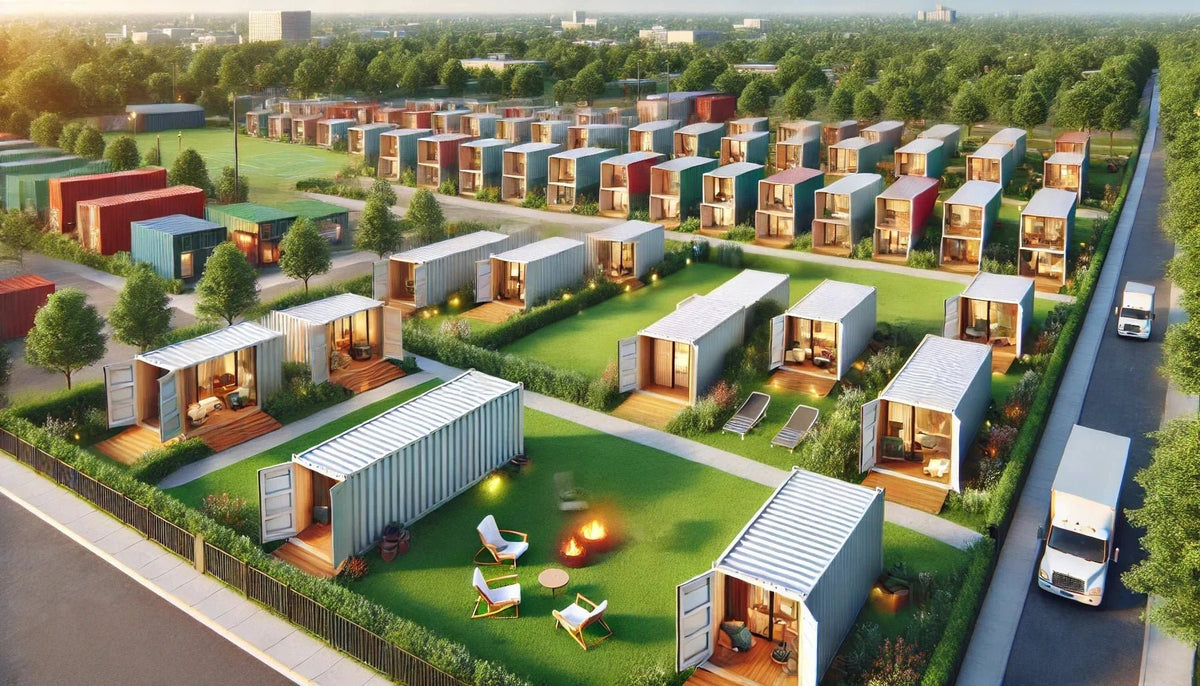
Container Homes as Investments
|
Tiempo de lectura 3 min
|
Tiempo de lectura 3 min
Container homes have emerged as a versatile and innovative solution for affordable and sustainable living. Beyond their use as personal residences, container homes offer exciting opportunities for investors. From creating container parks to affordable university housing, here are some compelling ways to leverage container homes as profitable investments.
Leasing Container Homes: Investors can develop container parks where individual units are leased to tenants. These parks can offer a range of amenities similar to traditional housing communities, such as communal gardens, playgrounds, and recreational areas. By providing a unique living experience, container parks can attract a diverse group of tenants, from young professionals to retirees.
Lease-to-Own Models: Implementing a lease-to-own model can make container homes more accessible to those who may not qualify for traditional mortgages. Tenants can lease a container home with the option to purchase it after a certain period. This model not only provides steady rental income but also creates a pathway to homeownership for renters.
Re-Selling After Setup: Investors can also buy, set up, and resell container homes within a community. By developing a well-planned container park with essential amenities, investors can enhance the value of individual units, making them attractive to buyers looking for affordable yet stylish housing options.
Renting Out Bedrooms: Container homes can be transformed into affordable university housing by renting out each bedroom to students. A well-designed container home can include multiple bedrooms, shared living spaces, and communal amenities. This setup provides an economical housing solution for students while generating steady rental income for investors.
Partnerships with Universities: Investors can partner with universities to develop container home communities specifically for students. These partnerships can include arrangements where the university helps market the housing options and possibly even subsidizes the rent for students. This ensures a consistent demand for the units and long-term financial stability.
Short-Term Rentals: Container homes are perfect for short-term vacation rentals, offering a unique and memorable experience for travelers. Investors can capitalize on the growing trend of eco-tourism by marketing container homes as sustainable vacation options. Platforms like Airbnb can be used to reach a global audience, maximizing occupancy rates and rental income.
Eco-Friendly Resorts: Developing eco-friendly resorts with container homes can attract tourists seeking sustainable travel options. By integrating renewable energy sources, water-saving technologies, and eco-friendly amenities, investors can create a niche market that appeals to environmentally conscious travelers.
Utilizing Vacant Lots: In urban areas, container homes can be used to fill vacant lots, transforming underutilized spaces into vibrant communities. These infill projects can provide affordable housing options in high-demand areas, attracting renters and buyers looking for economical urban living.
Pop-Up Communities: Temporary or semi-permanent pop-up container home communities can be set up for events, festivals, or transitional housing. These flexible housing solutions can be moved or reconfigured as needed, providing a versatile investment opportunity.
Retail Shops and Cafes: Container homes can be repurposed into retail shops, cafes, and other commercial spaces. These units can be leased to small businesses, creating a steady stream of rental income. The unique aesthetic of container structures can attract customers and enhance the overall appeal of the commercial area.
Office Spaces: Investors can develop container home office spaces for freelancers, startups, and small businesses. These compact and efficient workspaces can be leased on flexible terms, catering to the growing demand for remote and co-working environments.
Container homes offer a wide range of investment opportunities, from residential communities to commercial ventures. Their affordability, sustainability, and versatility make them an attractive option for investors looking to diversify their portfolios and capitalize on emerging housing trends. By exploring innovative uses such as container parks, university housing, and eco-friendly resorts, investors can tap into the growing market for container homes and achieve significant returns.
Container parks are communities of container homes that offer amenities similar to traditional housing communities. They can be leased, set up as lease-to-own, or resold. |
Container homes can be rented out by the bedroom to students, providing affordable housing solutions. Investors can partner with universities to ensure consistent demand. |
Container homes offer a unique and eco-friendly vacation experience. They can be marketed on platforms like Airbnb to attract environmentally conscious travelers. |
Container homes can fill vacant lots in urban areas, providing affordable housing options. They can also be used for temporary or pop-up communities for events or transitional housing. |
Yes, container homes can be repurposed into retail shops, cafes, and office spaces. These commercial units can be leased to small businesses, generating rental income. |
Container homes are affordable, sustainable, and versatile. They offer diverse investment opportunities, from residential communities to commercial ventures, with potential for high returns. |